China Brands, Marketing & Consumers
Overview of the Dolce&Gabbana China Marketing Disaster Through Weibo Hashtags
The D&G China marketing crisis in hashtags.
Published
7 years agoon

First published
The controversies surrounding Italian fashion brand D&G in China have been dominating Weibo’s top trending lists this week. Because it’s a somewhat messy affair, we’ll explain the story hashtag by hashtag.
November of 2018 will go down in Dolce & Gabbana history for the China marketing nightmare that has been unfolding over the recent days.
The Italian fashion house, that has been founded in 1985 by designers Domenico Dolce and Stefano Gabbana, is now facing consumer outrage and backlash on Chinese social media. Chinese e-commerce sites have removed Dolce & Gabbana products and Chinese netizens are posting photos of empty D&G stores.
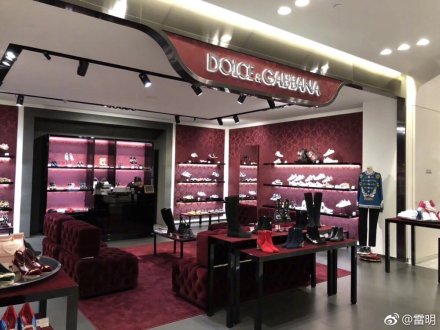
An overview of what has happened over the past week through Weibo hashtags:
SUNDAY, NOVEMBER 18
“DG LOVES CHINA” #DG爱中国#
15,7 MILLION VIEWS – On Sunday, November 18, Dolce & Gabbana posted three videos to social media in a series titled “Eating With Chopsticks” in light of its “DG Loves China” campaign, promoting its upcoming big fashion show in Shanghai that would take place on Wednesday, November 21st.
The brand had been doing quite well in China in the month before. The Digital Crew website wrote in October that D&G had “hit the nail on the right spot” with their recent move to cast Chinese celebrity Dilraba Dilmurat and Chinese stylist Han Huohuo at their Milan fashion show catwalk, receiving praise from Chinese netizens.
Its new video campaign, however, was not received with praise. The videos feature a Chinese-looking model dressed in D&G clothes using chopsticks to eat Italian dishes such as pizza, cannoli, and spaghetti. Unsuccessful at clumsily trying to eat these dishes, a male Chinese voice-over in the video then suggests things such as that the cannoli might be “too big” for the lady, and that she could try by digging in and eating smaller pieces with her chopsticks.
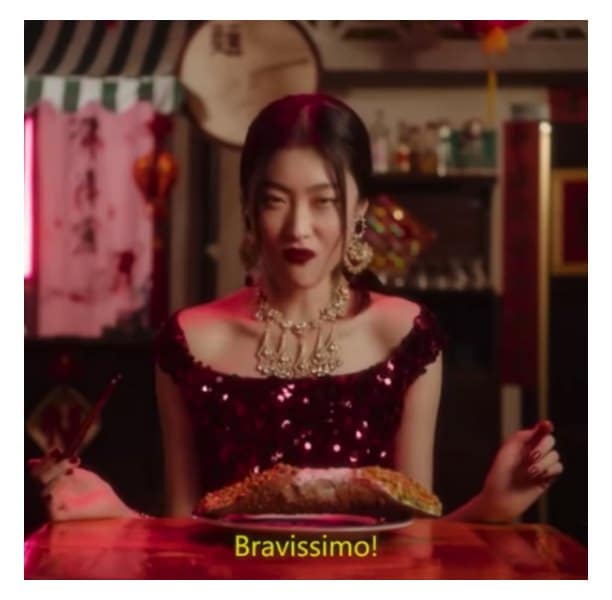
(Watch all clips here on Youtube and judge for yourself.)
The clips were not much appreciated for various reasons. Some Chinese netizens thought the campaign was making fun of Chinese chopsticks, others thought the comment of the Italian bread being “too big” for the Chinese model had a sexist undertone.
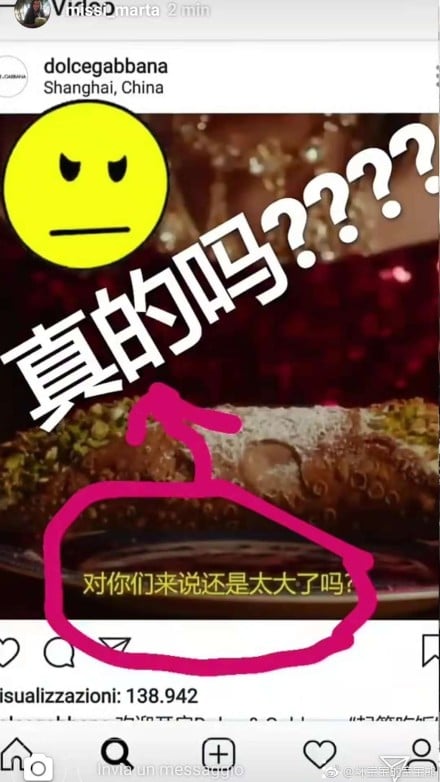
Subtitles: “This is perhaps too big for you?” Netizen’s comment: “Seriously?!”
“A disgusting campaign,” some called it.
Meanwhile, English-language media wrote that Dolce & Gabbana’s latest campaign was called “racism” by Chinese. Although the ad was indeed called racist by some Chinese on Weibo, the majority of commenters were mainly upset about the portrayal of chopsticks in the series. The hashtag “D&G Ad” (#DG广告#) received 170 million views.
WEDNESDAY, NOVEMBER 23
“D&G SUSPECTED OF INSULTING CHINA” #DG涉嫌辱华#
410 MILLION VIEWS – The social media storm snowballed out of control after screenshots of comments attributed to fashion designer Stefano Gabbana went viral on Wednesday, also being reposted by major Chinese state media accounts such as Global Times.
Various Instagram screenshots showed how, from the account of Stefano Gabbana, statements were made about China being a “shit country” and other derogatory remarks.
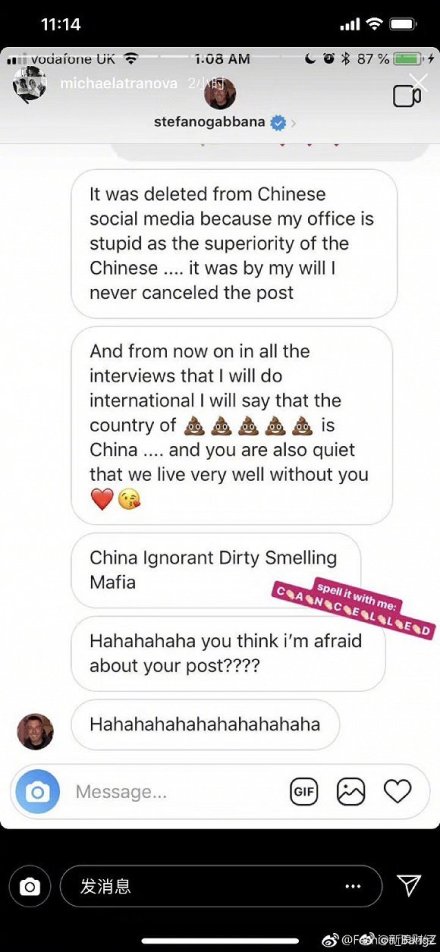
The screenshots were posted by Instagram user Michaela Phuong Thanh Tranova (@michaelatranova), a fashion business student, although it is still unclear why this Instagram user would have a private Instagram conversation with Stefano Gabbana and whether or not they are acquainted.
The statements went viral on Chinese social media, where they led to waves of criticism and anger, with people defending China and calling for a boycott of D&G.
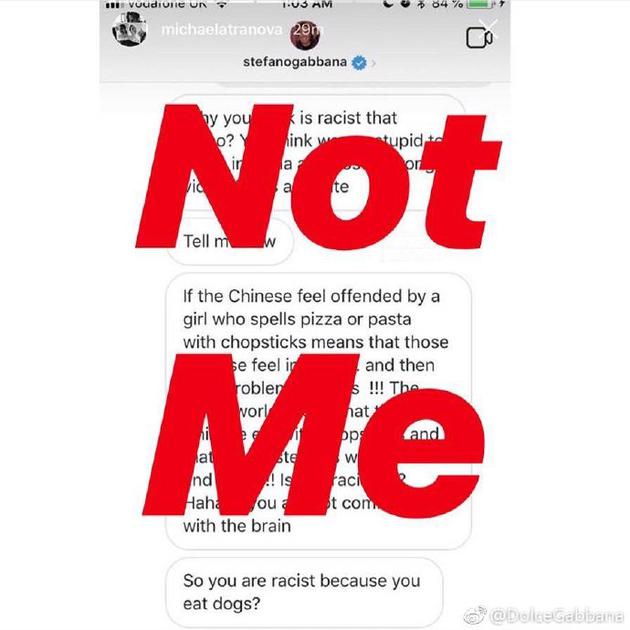
Amid the allegations, the designer on Wednesday said that his Instagram account had been hacked and posted an image with the words “NOT ME” written across one of Tranova’s screenshots. The company similarly claimed to have been hacked in a statement posted on its official Instagram page. “We have nothing but respect for China and the people of China,” the statement read.
WEDNESDAY, NOVEMBER 21
“DG BIG SHOW CANCELED” #DG大秀取消#
820 MILLION VIEWS – Later on Wednesday, the D&G issue hit the topic trending lists on Weibo, when it was announced that the big Shanghai fashion show was called off.
According to Jing Daily, it was China’s Cultural and Tourism Department that ordered Dolce & Gabbana to cancel the event, just a few hours before it was scheduled to take place and amid reports that Chinese celebrities were canceling their attendance at the show for the fact that the brand was “insulting to China” (辱华).

Photos of an empty D&G fashion show scene were posted on Weibo.
The official D&G account did not mention the reason for the cancelation, nor who ordered it, but just wrote on Weibo: “The fashion show that was planned on November 21st at 20.00 has been rescheduled due to circumstances, we deeply regret any inconvenience caused.”
By now, the online anger about D&G insulting China through its ad and Gabbana’s statements had grown so big, that most people simply wished for the Italian fashion house to “get lost.”
FRIDAY, NOVEMBER 23
“DG USES CHINESE TO APOLOGIZE” #DG用中文道歉#
360 MILLION VIEWS – On Friday afternoon, China time, Dolce and Gabbana released an apology video on its official Weibo account. The video shows Domenico Dolce and Stefano Gabbana sitting at a table with grave expressions on their face (see embedded Tweet below).
The founder of @dolcegabbana said sorry in Chinese to all Chinese people around the world, saying that they will respect Chinese culture more. The apology video was posted on its official Weibo account in China. pic.twitter.com/ADflYhMIhC
— Global Times (@globaltimesnews) 23 november 2018
The two speak in Italian as they say that they “feel very grieved” over what their “statements and actions” have brought about “for Chinese people and their country” over the past few days, and that they hope they can be forgiven for their “misunderstanding of [Chinese] culture.”

They end the video by apologizing in Chinese, saying “duibuqi“.
Before midnight, the video had received more than 166,000 comments and more than half a million shares. Over 100,000 people ‘liked’ the post.
Among the most popular comments, there were those inquiring if Gabbana’s Instagram had been hacked or not, since the video does not mention it. “Were you hacked or not, because if you weren’t, then I won’t accept your apology,” one of the most popular comments said.
FRIDAY, NOVEMBER 23
“Requesting D&G Money Back” #DG柜姐回应退预存金#
160 MILLION VIEWS – Meanwhile, a screenshot of a WeChat conversation between a customer seeking a refund and a representative from Dolce & Gabbana Hangzhou also has gone viral on Chinese social media, ending up in the top ten charts of the day.
The screenshots show that the woman demands back a deposit she paid D&G of 2400 yuan ($346), saying she no longer wants to wear the brand for fear people would “throw sh*t at her.”
D&G Hangzhou then responded to the issue, saying that they would not refund money because of this “temporary crisis.”
“A temporary storm can also turn into a permanent one,” some commenters said.
Whether or not this “temporary” storm will indeed turn into a serious long-term China marketing crisis for D&G is yet to be seen. In the past, Daimler China also found itself at the center of a social media storm in China after using a Dalai Lama quote in its advertisement in March of this year (listen to this BBC news fragment here), which seemingly had little consequences for the brand, as it is still expanding in China.
The Lotte group also faced serious backlash in China in light of the THAAD crisis. The Lotte boycott of 2017 in the end turned out to be critical for the brand’s presence in China, with the group losing $46 million every quarter due to the China situation.
By Manya Koetse, with contributions from Miranda Barnes
Follow @whatsonweibo
Spotted a mistake or want to add something? Please let us know in comments below or email us.
©2018 Whatsonweibo. All rights reserved. Do not reproduce our content without permission – you can contact us at info@whatsonweibo.com
Manya is the founder and editor-in-chief of What's on Weibo, offering independent analysis of social trends, online media, and digital culture in China for over a decade. Subscribe to gain access to content, including the Weibo Watch newsletter, which provides deeper insights into the China trends that matter. More about Manya at manyakoetse.com or follow on X.

China Arts & Entertainment
Passing the Torch from ‘Ne Zha’ to ‘Nobody’: China’s Box Office Poster Relay Tradition
With China’s box office relay tradition, every movie’s success becomes a win for Chinese cinema.
Published
2 months agoon
August 20, 2025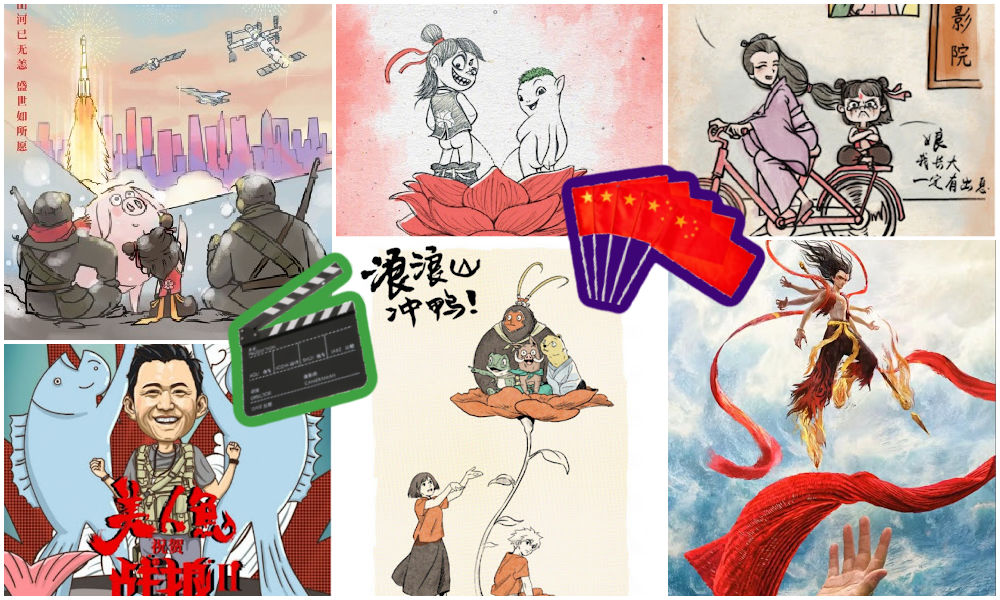
When one film breaks a record in China, the previous champion often celebrates with a playful and creative congratulatory poster. It’s a uniquely Chinese mix of solidarity, box-office success, and internet culture.
China’s 2025 summer box office season has been a success, surpassing 10 billion yuan (~US$1.4 billion), driven by record-breaking domestic films that have also made waves on Chinese social media.
Somewhat unexpectedly, the Chinese 2D animated feature Nobody (浪浪山小妖怪) has emerged as the season’s breakout hit.
On August 11, Nobody overtook the total earnings of the 2016 hit Big Fish & Begonia (大鱼海棠), also a domestically produced animation, becoming the highest-grossing domestic 2D animated film in Chinese history.
In keeping with industry tradition, Big Fish & Begonia celebrated the milestone by releasing a congratulatory poster on its official Weibo account.
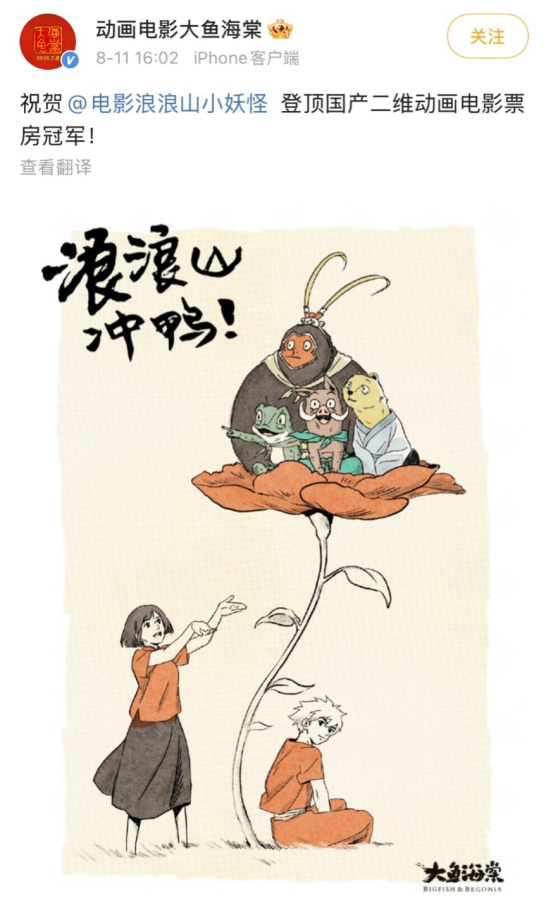
The poster shows the quirky characters of Nobody sitting on top of a giant red flower, while the protagonists of Big Fish & Begonia cheer them on from below. Written in bold calligraphy (“浪浪山冲鸭!”) is a playful phrase to cheer the movie on (translatable as: “Go, Langlang Mountain!” [Langlang Mountain is the original Chinese title.])
This is a unique “tradition” in China’s film industry: whenever a movie breaks a box-office record—no matter the category—the previous record-holder pays tribute by releasing a specially designed “congratulatory poster” in a gesture of camaraderie.
These posters are usually shared through the official Weibo accounts of the former champions, as it is common for Chinese film and TV drama productions to have their own accounts on Weibo.
Origins of the Poster Relay in China
The tradition of the so-called “box-office champion poster relay” (票房冠军海报接力) in China dates back to 2015, when Xu Zheng’s hit Lost in Thailand (泰囧)—which had held the record for highest-grossing domestic film since 2012 with a box office of 1.267 billion yuan (~US$200M)—was overtaken by Monster Hunt (捉妖记), which went on to gross 2.44 billion yuan (~US$340M).
Director Xu Zheng, who also starred in Lost in Thailand, took the initiative to release a humorous congratulatory poster for Monster Hunt. In the image, the little monster Huba (胡巴) is shown dancing on Xu’s bald head, accompanied by the text: “Lost in Thailand congratulates Monster Hunt on topping the Chinese box office.”
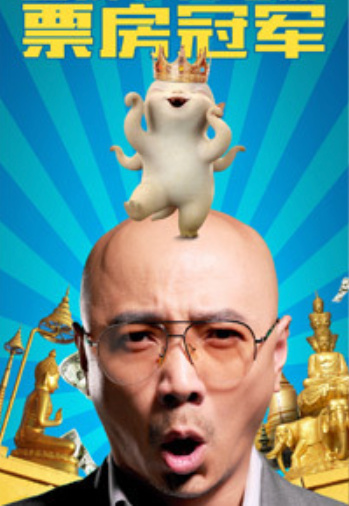
The poster that started a tradition.
Then, in 2016, Stephen Chow’s The Mermaid (美人鱼) surpassed Monster Hunt with a box office take of over 2.44 billion yuan (~US$340M). In response, the Monster Hunt team also released a congratulatory poster showing its main character Huba transformed into a mermaid, gazing up at the tail of The Mermaid.
The text on the poster reads: “Xing Ye (星爷) reaches the top, and Huba comes to congratulate him” — Xing Ye being Stephen Chow’s well-known nickname in Chinese. The vertical text on the right quoted lyrics from The Mermaid’s theme song: “You ask if this mountain is the highest in the world — there are always mountains higher than the other.”

Monster Hunt had been congratulated for its own win; now it was its turn to congratulate The Mermaid.
The relay continued in 2017 when Wolf Warrior 2 (战狼2) became the first Chinese film to cross the 5-billion-yuan mark (~US$700M), topping the chart. The Mermaid sent its congratulations with a poster featuring the Mermaid placing a crown on Wu Jing (吴京), the director and star of Wolf Warrior 2.
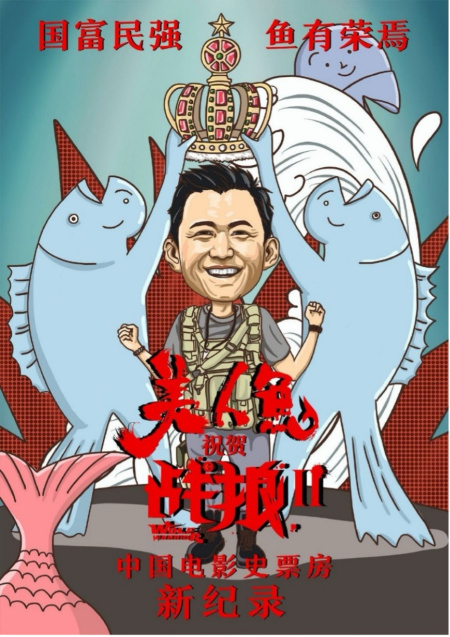
Caption: The Mermaid’s congratulatory poster for Wolf Warrior 2 in 2017. The text at the top reads: “When the nation is prosperous and the people are strong, the Mermaid shares in the honor.”
Beyond the Championship
Over time, the tradition expanded. Films that were overtaken in the rankings, even if it was not a change of the championship, also began releasing congratulatory posters.
In 2019, the animated sensation Ne Zha 1 (哪吒之魔童降世) surpassed a string of blockbusters, including Monster Hunt, Operation Red Sea (红海行动), and The Wandering Earth (流浪地球), to become the second-highest-grossing Chinese film at the time. Each of these films then sent their own tribute to “Little Nezha.”
A hand-drawn congratulatory poster by Xu Chengyi (许诚毅), the director of Monster Hunt, said: “We are all little monsters, free and easy together,” as a slight twist on Nezha’s classic line from the movie.
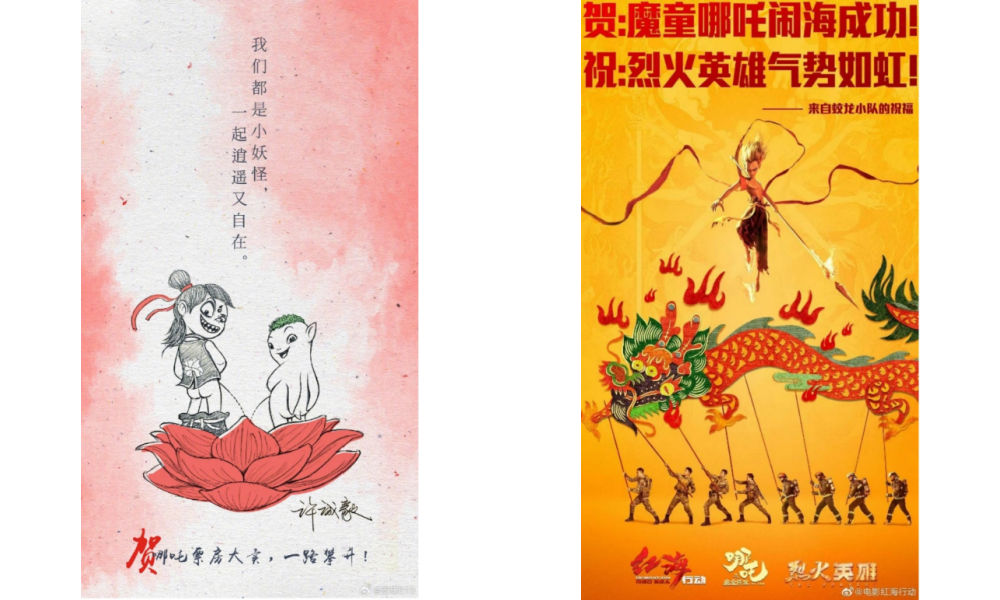
Congratulatory posters by Monster Hunt and Operation Red Sea to celebrate the success of Ne Zha in 2019.
The congratulatory poster by Operation Red Sea to Ne Zha 1 in 2019 also included a reference to The Bravest (烈火英雄), another film from the same producer, Bona Film Group, released at the same time as Ne Zha 1. In doing so, Bona used the popularity of Ne Zha 1 to promote its own new film at the same time.
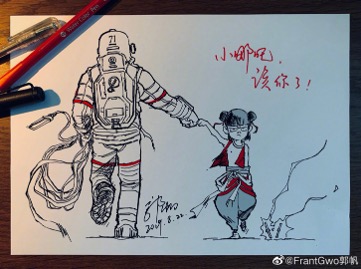
Congratulatory poster by Guo Fan(郭帆), director of The Wandering Earth.
In 2019, Guo Fan (郭帆), the director of The Wandering Earth (流浪地球), hand-drew a congratulatory poster for Ne Zha. The illustration featured playful artwork accompanied by the text: “Little Nezha, now it’s your turn!”
Ne Zha also set a milestone for Chinese animation in an international context, earning 1.834 billion yuan (~US$260M) within nine days and reclaiming the animated film box office record in China from Zootopia.
Coloroom Pictures, the producer of Ne Zha and other Chinese animated hits, marked the achievement with a poster that both celebrated the unity of China’s animation community and acknowledged the challenges that still lay ahead, writing: “Chinese animation has taken a big step forward, but it is still just starting out.”
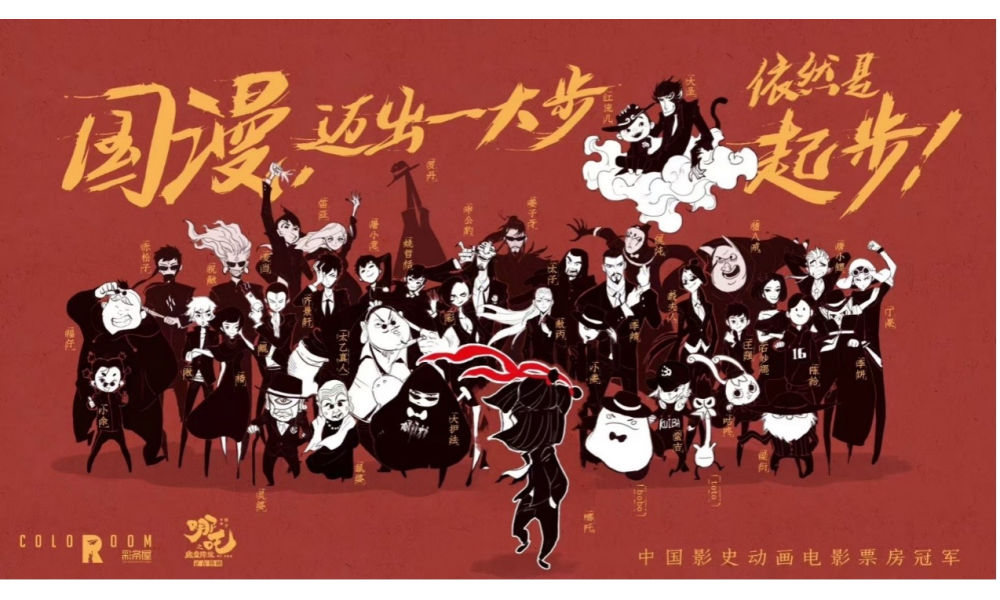
The poster features dozens of Chinese anime characters in formal dress, with Little Nezha standing in front of them and looking back.
These kinds of online congratulatory wishes, resonating with netizens, continued in 2021 when Hi, Mom (你好,李焕英) climbed to second place in China’s all-time box office.
Ne Zha 1 then released a hand-drawn poster showing Nezha sitting on the back of his mother’s bicycle, vowing to make something of himself—a promise fulfilled four years later when Ne Zha 2 actually surpassed Hi, Mom in early 2025.

Ne Zha 1’s congratulatory poster to Hi, Mom in 2021. The poster depicted a scene in front of Chentangguan Cinema where Hi, Mom is being shown, with Nezha sitting on the back seat of his mother’s bicycle (a classic scene in Hi, Mom’s promotion poster), vowing, “Mom, I will surely make something of myself when I grow up.”
In return, Hi, Mom published a poster in a matching style to response Ne Zha’s congratulatory poster in 2021.
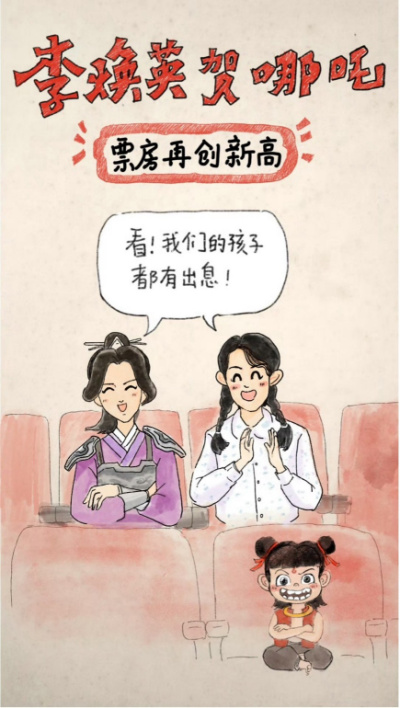
Hi, Mom’s congratulatory poster to Ne Zha 2 in 2025, in which Nezha’s mother and the mother from Hi, Mom sitting together and applauding for the success of Ne Zha 2, saying, “Look! Our children are all promising.”]
All these exchanges have created unexpected interactions between vastly different movie genres.
In November 2021, when the war epic The Battle at Lake Changjin (长津湖) surpassed Chinese animation feature Ne Zha 1, the congratulatory poster released by Ne Zha 1 depicted Nezha alongside volunteer army soldiers, gazing at rockets, fighter jets, and satellites.
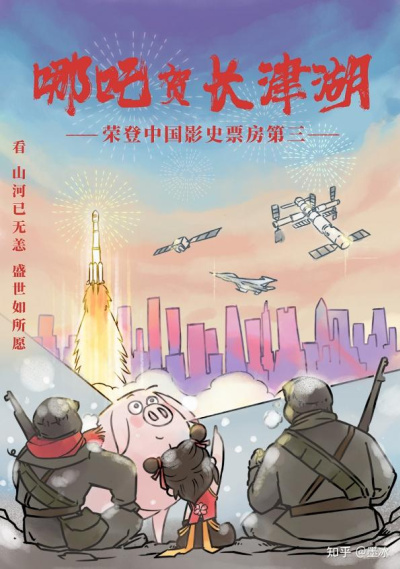
Ne Zha 1’s congratulatory poster to The Battle at Lake Changjin in 2021.
In 2025, when Ne Zha 2 seized the all-time box-office crown, The Battle at Lake Changjin also responded with a creative image.
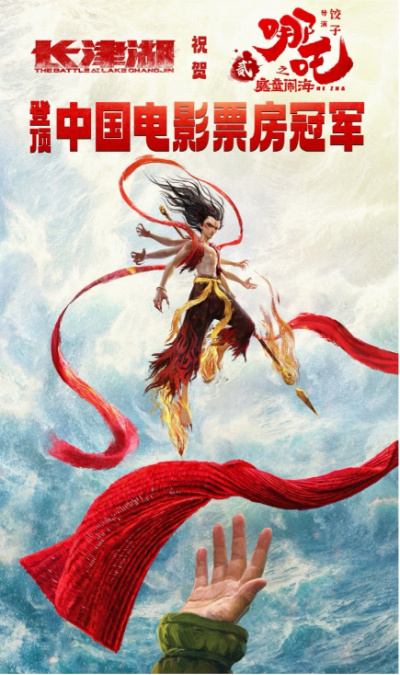
The Battle at Lake Changjin’s congratulatory poster to Ne Zha 2 in 2025.
In that image, Nezha’s magical weapon the Hun Tian Ling (混天绫) was ingeniously linked to the red scarf thrown to soldiers in The Battle at Lake Changjin. At the bottom, a soldier’s large hand is shown in a lifting gesture, holding Nezha up.
The concept of such a serious war movie interacting with a humorous animated film sparked some excitement among Chinese netizens at the time. They saw the exchange as a dialogue between traditional mythology and modern history, and as a symbol of the continuity and success of China’s film industry.
A Unique Chinese Tradition?
The custom of one film “passing on the torch” to the next hit film through a congratulatory message is not entirely unique to China. The practice can actually be traced back to Hollywood.
In 1977, when Star Wars dethroned Jaws at the North American box office, director Steven Spielberg congratulated George Lucas with a full-page ad in Variety, humorously depicting R2-D2 reeling in the great white shark.
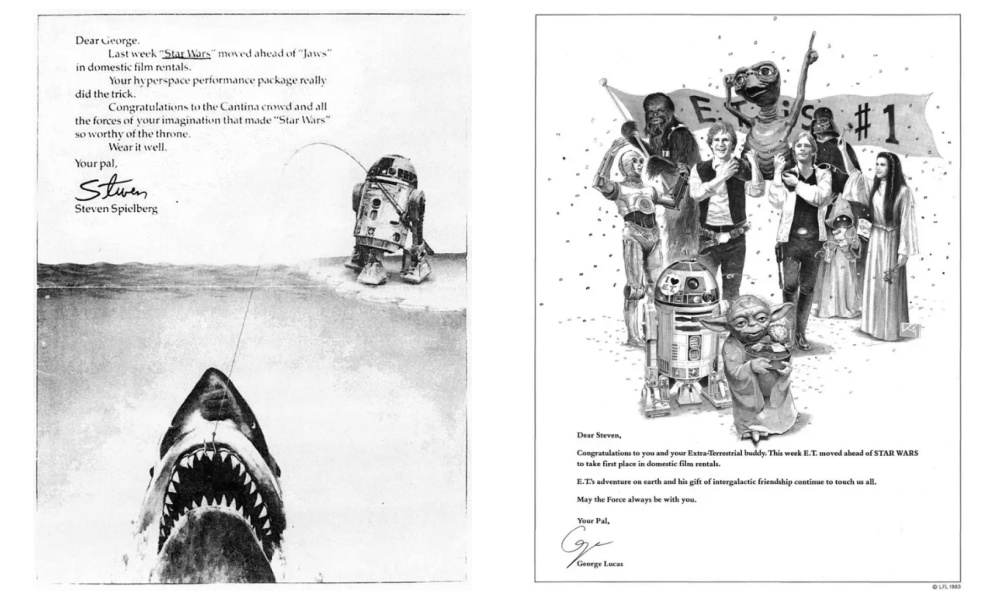
When Star Wars was dethroned by Titanic at the global box office in 1998, George Lucas sent a famous congratulatory message to James Cameron, again as a full-page ad in Variety.

Star Wars meets Titanic, famous congratulatory message to James Cameron .
In May 2019, when Avengers: Endgame officially overtook Titanic’s worldwide box office total to become the second-highest-grossing film of all time (behind Avatar), James Cameron — director of both Titanic (1997) and Avatar (2009) — posted a congratulatory image to salute Marvel Studios.
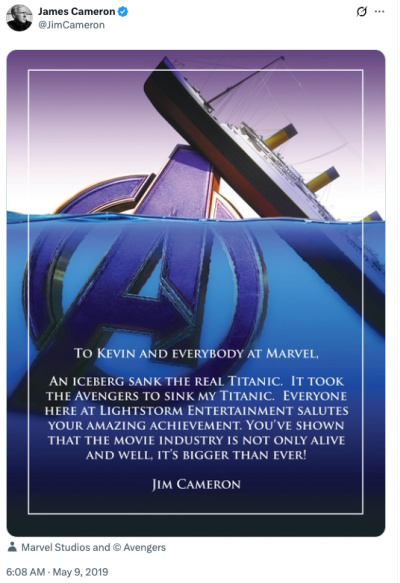
James Cameron on Twitter in May 2019.
So, although the practice of “passing the torch” among box office record-holders is not uniquely Chinese, the way it has developed in China is very distinct:
🔹 In Hollywood, box-office champions often hold the crown for years, and the ‘changing of the guards’ is relatively rare. In China, however, the industry has flourished mainly in the past decade, and records are broken far more frequently.
🔹 Social media has become central to promotion and marketing. Virtually all major Chinese films run active official accounts that not only post promotional material but also engage in playful interactions with other productions.
🔹 In Hollywood, congratulatory notes tend to come from individual directors, who salute each other as “friendly competitors.” In China, the messages are sent from the films’ official accounts, presenting it more as team-to-team recognition.
🔹 In that sense, it’s not just “movie versus movie,” but rather the Chinese film industry collectively measuring itself against Hollywood and other foreign hits. Each congratulatory poster is therefore not only a celebration of a new record, but also a statement of pride in the broader success of Chinese cinema.
🔹 Participation is not limited to the very top box-office leaders; other productions often join in, creating a ripple effect of collective celebration.
In China, the frequent turnover of box-office leaders combined with the creativity of these posters has turned the practice into a beloved feature of both film culture and the social media landscape.
In an earlier online poll, a majority of respondents described the tradition as “encouraging, and a demonstration of solidarity in China’s film industry.” Others called it a form of “romantic etiquette” unique to Chinese cinema.
Most importantly, it simply feels good — a win-win for both older and newer productions. As one netizen wrote after seeing the congratulatory artwork from Big Fish & Begonia’s official account: “I was inspired and hope that these little monsters can give everyone the courage to set out on their journeys, as well as the strength and passion to pursue their dreams. I hope domestic animation will keep getting better and better!”
By Wendy Huang
Edited by Manya Koetse
Spotted a mistake or want to add something? Please let us know in comments below or email us. Please note that your comment below will need to be manually approved if you’re a first-time poster here.
©2025 Whatsonweibo. All rights reserved. Do not reproduce our content without permission – you can contact us at
info@whatsonweibo.com
China ACG Culture
A Very Short Guide to China’s Most Popular Designer Toys
Published
3 months agoon
July 6, 2025
In our last article, we’ve determined how Wakuku’s rise is not just about copying & following in Labubu’s footsteps and more about how China is setting the pace for global pop culture IPs. I now want to give you a small peek into the main characters in the field that are currently relevant.
Even if these dolls aren’t really your thing, you’ll inevitably run into them and everything happening around them.
Before diving into the top trending characters, a quick word on the challenges ahead for Labubu & co:
🚩 Bloomberg Opinion columnist Shuli Ren recently argued that Labubu’s biggest threat isn’t competition from Wakuku or knockoffs like “Lafufu,” but the fragility of its resale ecosystem — particularly how POP MART balances supply, scarcity, and reseller control.
Scarcity is part of what makes Labubu feel premium. But if too many dolls go to scalpers, it alienates real fans. If scalpers can’t profit, Labubu risks losing its luxury edge. Managing this dynamic may be POP MART’s greatest long-term challenge.
🚩 Chinese Gen Z consumers value authenticity — and that’s something money can’t manufacture. If China’s booming IP toy industry prioritizes speed and profit over soul, the hype may die out at a certain point.
🚩 The same goes for storytelling. Characters need a solid universe to grow in. Labubu had years to build out its fantasy universe. Cute alone isn’t enough — characterless toys don’t leave a lasting impression and don’t resonate with consumers.

Examples of popularity rankings of Chinese IP toys on Xiaohongshu.
With that in mind… let’s meet the main players.
On platforms like Xiaohongshu, Douyin, and Weibo, users regularly rank the hottest collectible IPs. Based on those rankings, here’s a quick who’s-who of China’s current trend toy universe:

1. Labubu (拉布布)
Brand: POP MART
Creator: Kasing Lung
Year launched: 2015 (independent), 2019 with POP MART.
The undisputed icon of China’s trend toy world, Labubu is a mischievous Nordic forest troll with big eyes, nine pointy teeth, and bunny ears. Its quirky, ugly-cute design, endless possibilities of DIY costume changes, and viral celebrity endorsements have made it a must-have collectible and a global pop culture phenomenon.

2. Wakuku (哇库库)
Brand & Creator: Letsvan, backed by QuantaSing Group
Year launched: 2024 with first blind box
Wakuku, a “tribal jungle hunter” with a cheeky grin and unibrow, is seen as the rising star in China’s trend toy market. Wakuku’s rapid rise is fueled by celebrity marketing, pop-up launches, and its strong appeal among Gen Z, especially considering Wakuku is more affordable than Labubu.

3. Molly (茉莉)
Brand: POP MART
Designer: Kenny Wong (王信明)
Year launched: 2006 (creator concept); POP MART 2014, first blind boxes in 2016
Molly is a classic trend toy IP, one of POP MART’s favorites, with a massive fanbase and long-lasting popularity. The character was allegedly inspired by a chance encounter with a determined young kid at a charity fundraiser event, after which Kenny Wong created Molly as a blue-eyed girl with short hair, a bit of a temperament, and an iconic pouting expression that never leaves her face.

4. SKULLPANDA (骷髅熊猫)
Brand: POP MART
Creator: Chinese designer Xiong Miao
Year launched: 2018 (creator concept); POP MART 2020
Skullpanda is one of POP MART’s flagship IPs —it’s a goth-inspired fantasy design. According to POP MART, SKULLPANDA journeys through different worlds, taking on various personas and living out myriad lives. On this grand adventure, it’s on a quest to find its truest self and break new ground all while contemplating the shape of infinity.
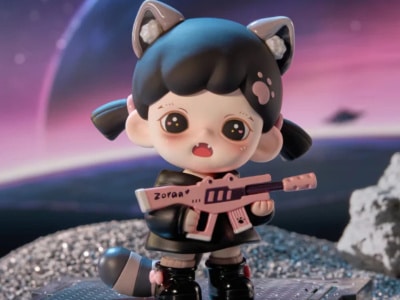
5. Baby Zoraa
Brand: TNT SPACE
Creator: Wang Zequn, CEO of TNT SPACE
Year launched: 2022, same year as company launch
Baby Zoraa is cute yet devlish fierce and is one of the most popular IPs under TNT SPACE. Baby Zoraa is the sister of Boy Rayan, another popular character under the same brand. Baby Zoraa’s first blind box edition reached #1 on Tmall’s trend toy sales charts and sold over 500,000 units.

6. Dora (大表姐)
Brand: TNT SPACE
Year Launched: 2023
Dora is a cool, rebellious “big sister” figure, instantly recognizable for her bold attitude and expressive style. She’s a Gen Z favorite for her gender-fluid, empowering persona, and became a breakout sucess under TNT when it launched its bigger blind boxes in 2023.

7. Twinkle Twinkle [Star Man] (星星人)
Brand: POP MART
Creator: Illustrators Daxin and Ali
Year launched: In 2024 with POP MART
This character has recently skyrocketed in popularity as a “healing star character” inspired by how stars shine even in darkness. POP MART markets this character as being full of innocence and fantasy to provide some relaxation in this modern society full of busyness and pressure.

8. Hirono (小野)
Brand: POP MART
Creator: Lang
Year launched: In 2024 with POP MART
This freckled, perpetually grumpy boy has a wild spirit combining introversion and playful defiance. Hirono highlights the subtle fluctuations of life, its ups and downs, incorporating joy, sadness, fear, and more – a personification of profound human emotions.

9. Crybaby (哭娃)
Brand: POP MART
Creator: Thai artist Molly Yllom (aka Nisa “Mod” Srikamdee)
Year launched: 2017 (creator concept), 2023 POP MART launch
Like Wakuku, Crybaby suddenly went from a niche IP to a new hot trend toy in 2025. Together with Wakuku, it is called the “next Labubu.” Thai artist Molly Yllom created the character after the loss of her beloved dog. Crybaby is a symbol of emotional expression, particularly the idea that it’s okay to cry and express feelings.

10. Pouka Pouka (波卡波卡)
Brand: 52TOYS
Creator: Ma Xiaoben
Year launched: 2025
With its round, chubby face, squirrel cheeks, playful smile, and soft, comforting appearance, Pouka Pouka aims to evoke feelings of warmth, healing, and emotional comfort.
Other characters to watch: CiciLu, Panda Roll (胖哒幼), NANCI (囡茜), FARMER BOB (农夫鲍勃), Rayan, Ozai (哦崽), Lulu the Piggy (LuLu猪), Pucky (毕奇).
By Manya Koetse
(follow on X, LinkedIn, or Instagram)
Spotted a mistake or want to add something? Please let us know in comments below or email us. First-time commenters, please be patient – we will have to manually approve your comment before it appears.
©2025 Whatsonweibo. All rights reserved. Do not reproduce our content without permission – you can contact us at info@whatsonweibo.com.
Subscribe
What’s on Weibo is a reader-supported publication, run by Manya Koetse (@manyapan), offering independent analysis of social trends in China for over a decade. To receive new posts and support our work, consider becoming a paid subscriber.

Get in touch
Would you like to become a contributor, or do you have any tips or suggestions? Get in touch here!

The Wong Kar-wai Scandal Explained: The Dark Side of ‘Blossoms Shanghai’

Jingdezhen’s “Chicken Chop Bro”, Golden Week Travel Trends & China’s Donkey Shortage Crisis

Evil Unbound (731): How a Chinese Anti-Japanese War Film Backfired
China’s Prefab Storm Explained: Luo Yonghao vs. Xibei & the Great Yùzhìcài Debate

Trending on Weibo: ‘731’ Movie, Actor Xie Mengwei Detained, Hangzhou Chemical Waste Death

Hidden Cameras and Taboo Topics: The Many Layers of the “Nanjing Sister Hong” Scandal

“Jiangyou Bullying Incident”: From Online Outrage to Offline Protest

A Very Short Guide to China’s Most Popular Designer Toys

The Rising Online Movement for Smoke-Free Public Spaces in China

China Trend Watch: Pagoda Fruit Backlash, Tiananmen Parade Drill & Alipay Outage (Aug 11–12)
Popular Reads
-

 China Memes & Viral3 months ago
China Memes & Viral3 months agoHidden Cameras and Taboo Topics: The Many Layers of the “Nanjing Sister Hong” Scandal
-

 China Books & Literature11 months ago
China Books & Literature11 months agoThe Price of Writing Smut: Inside China’s Crackdown on Erotic Fiction
-

 China Insight5 months ago
China Insight5 months agoUnderstanding the Dr. Xiao Medical Scandal
-

 China Memes & Viral9 months ago
China Memes & Viral9 months agoOur Picks: Top 10 Chinese Buzzwords and Phrases of 2024 Explained



